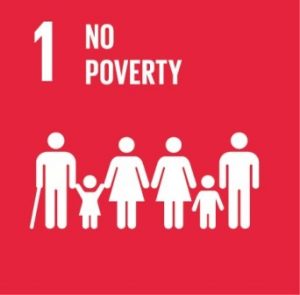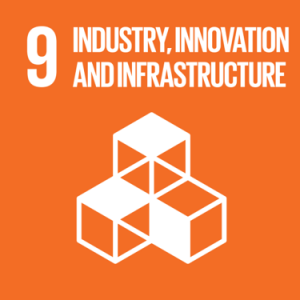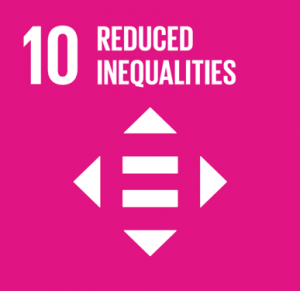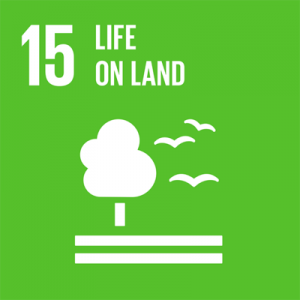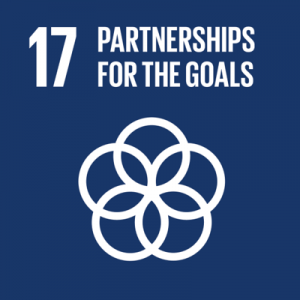SUSTAINABLE DEVELOPMENT GOALS

SDG 2 : ZERO HUNGER
“The ability to feed the world is a key element of sustainable development. If done right, agriculture, forestry and fisheries can provide nutritious food for all. At the same time it can ensure rural development with people at the centre of the process, supporting the incomes of those who rely on agriculture. Universities need to be able to demonstrate how they are contributing to end hunger, achieve food security and improved nutrition and promote sustainable agriculture.”
(THE Impact Rankings)
Campus Food Waste
IPB University demonstrates a strong commitment to sustainable waste management across its campus environment. Since 2021, all university units have been required to monitor and report their waste generation in accordance with the Circular Letter on Waste Management at IPB University and the Rector Decree No. 29/IT3/OT/2020. These policies reflect the university’s adoption of the 3R principles — Reduce, Reuse, and Recycle — as the foundation for environmental stewardship.

Throughout 2024, IPB systematically measured and managed its waste following SNI 19-3964-1994, ensuring that data collection met national standards. The system involves several stages:
- Food waste is collected and weighed at each station using precise digital scales.
- The collected waste is then sorted into categories such as rice, vegetables, and side dishes.
- Each category is weighed individually and the data are documented systematically.
Each waste category, including food waste, plastics, glass, and paper, was weighed using digital scales at collection points. The university recorded a total of 8.501 kilograms of organic and inorganic waste, a portion of which was transformed into compost and recycled into 137 paving blocks through student-led initiatives.
To prevent excessive food waste during campus events, organizers are required to accurately estimate attendance and adjust catering orders accordingly. In cases where there are changes in participant numbers, caterers are promptly informed to modify food portions. Furthermore, IPB collaborates with accredited charitable organizations through the Food Bank program, which redistributes surplus food and beverages from donors to students in need.
Student Hunger
In 2024, IPB University introduced several programs in place on student food insecurity and hunger:
- FoodBank: A program that collects food and drinks from donors and distributes them to students in need. In 2024, IPB University through the IPB Food Bank distributed over 1.000 food packages.

- Agrianita Faperta IPB: A total of 400 healthy lunch packages were distributed to active students of the Faculty of Agriculture, IPB University, by Agrianita Faperta IPB in collaboration with the Alumni Association of the Faculty of Agriculture and the Student Executive Board of the Faculty of Agriculture at the Dramaga Campus. The activity was organized as a form of concern and commitment to student welfare, as stated by the Chairperson of Agrianita, who emphasized that this program represents the embodiment of hard work and smart work in maintaining consistent care within the faculty environment.
- Warung Kita: Warung Kita IPB is known not only as an everyday place to eat, but also as a way of caring for the welfare of students in the academic environment of IPB. Through affordable prices and a cross-subsidy system, Warung Kita provides around 300 meal portions every day to ensure that all students, including those with limited financial means, can access nutritious food on campus. In 2024, BRI Peduli TJSL supported the expansion and improvement of Warung Kita’s facilities, strengthening its role as a platform for care and tangible support for IPB students, particularly in fostering an inclusive campus environment.

- Milk and Fruit Assistance: The Fruit and Milk Program is an IPB initiative aimed at improving students’ access to nutritious food. Since 2021, the program has distributed 100 free fruit and milk packages every working day to students from various academic levels. In 2024, the program also began reaching the Vocational School and Business School campuses, allocating around 100 packages per day.

- Daily free meals. The Free Meal Program by Alumni 18&19 is an initiative carried out through a collaboration between the 2018 and 2019 alumni and the Directorate of Student Affairs at IPB University. This program has been running for three years and aims to help meet the food needs of active IPB students in need. Every Monday to Friday, 35 students receive free dinner packages as a form of support for student welfare.

IPB University provides targeted interventions to ensure that no student experiences hunger by maintaining accessible, affordable, and nutritious food services on campus.
-
- FEMA Berbagi: One of the main focuses of this activity is the distribution of food, which includes providing staple foods and snacks to active students in need, ensuring that their basic needs are directly met.

- Free Drinking Water Stations: The Drinking Water Station (DWS) Program is a waqf-based initiative by IPB University that provides clean, free, and ready-to-drink water for the entire academic community. Since its launch in 2021 with a single unit at the Rectorate Building, the number of DWS units has steadily increased, reaching 23 units across 14 locations in 2024, with a total investment value of IDR 1,138,732,576, including distribution and maintenance costs. The installation sites cover various faculties, campus mosques, student dormitories, and the IPB Polyclinic.
- FoodBank: A program that collects food and drinks from donors and distributes them to students in need. In 2024, IPB University through the IPB Food Bank distributed over 1.000 food packages.

Based on the DWS distribution map, these units have reached nearly all major areas of IPB Dramaga Campus, ensuring easier access to drinking water for students and academic staff. In addition to improving the habit of drinking water, this program also provides economic benefits by reducing student expenditure on drinking water to around IDR 73,000 per person per month.

- FEMA Berbagi: One of the main focuses of this activity is the distribution of food, which includes providing staple foods and snacks to active students in need, ensuring that their basic needs are directly met.
IPB provides sustainable, healthy, and affordable food choices for all on campus. Examples of student’s favorite canteens are Sapta, Yellow Corner, Blue Corner, and Purple Corner, which provide menus for campus students and people who are vegan or vegetarian to be able to consume types of food that are tolerant of them.
Almost all the food provided in the IPB canteen is sold at a very friendly and affordable price. Healthy food can be seen in menu options that balance nutrition and food safety. To ensure food safety, IPB has conducted training for canteen tenants and IPB kitchen management, doing sampling and analysis to prove the good practices they follow. IPB has monitored food prices in all food outlets and regulated prices that should be affordable to students.

IPB also produces fresh and organic vegetables that are marketed at an affordable price for the campus population through Botani Fresh Mart, a retail outlet managed by the Business, Investment, and Waqf Management Agency (BP Biswaf) of IPB. Botani Fresh Mart offers a wide variety of fresh, locally sourced vegetables and fruits, promoting plant-based consumption among students and staff.
The mart partners with local farmers and national markets such as GrandLucky, Diamond Supermarket, YOGYA Group, and All Fresh, ensuring that the products are sustainably produced and distributed. Located within the IPB Dramaga campus, Botani Fresh Mart supports the university’s commitment to sustainable agriculture, food security, and accessible vegetarian and vegan food options for all members of the campus community.

All food provided in the IPB canteen is sold at an affordable price. Healthy food can be seen in menu options that balance nutrition and food safety. IPB also provides a canteen that offers subsidized nutritious meals for students in need, supported by IPB alumni. Warung Kita ensures that all students, regardless of their financial background, have access to healthy and affordable food options.

To ensure food safety, IPB has conducted training for canteen tenants and IPB kitchen management, taking samples and conducting analyses to verify their good practices. IPB has monitored food prices at all food outlets and set affordable prices for students. IPB also evaluates food quality on campus. In addition, food in IPB canteens has obtained Halal certification. This Halal certification demonstrates that IPB canteens are committed to the quality, safety, and halal status of the food and beverages sold.

IPB University takes several measures to address food security and alleviate hunger, both among staff and within the wider community. The university is actively involved in food provision and accessibility initiatives, as part of its commitment to social responsibility and community welfare.
IPB offers free lunch for staff every Wednesday during the weekly meeting. This program aims to strengthen relationships among staff and enhance the work environment. Informal interactions over lunch can help foster a more positive atmosphere and support productivity.

In 2024, IPB University distributed 5,197 Eid gift packages to all employees, including civil servants, permanent employees, contract employees, and daily workers. The gift packages consisted of 10 types of products such as beef, chicken, fish, premium rice, cooking oil, sugar, syrup, and wheat flour; the distribution was carried out as an expression of gratitude and sharing happiness ahead of Eid al-Fitr 1445 H.

On April 2, 2024, the leadership of IPB University, the Faculty of Animal Science, and the Department of Animal Production and Technology carried out the distribution of Eid al-Fitr 1445 Hijriah gift packages as an annual routine activity. The activity was intended to share happiness among faculty staff while strengthening bonds of togetherness and expressing appreciation for the contributions of all members within the institution.
Beyond internal programs, IPB University also collaborates with local government and non-governmental organizations to address broader food security issues in surrounding communities. These initiatives not only improve access to food but also promote sustainable practices and awareness. Such programs highlight IPB’s role as an institution that prioritizes not only academic excellence but also the well-being of its members and community stakeholders.
National Hunger
IPB University is strongly committed to improving access to food security and sustainable agriculture and aquaculture knowledge, skills, or technology for local farmers and food producers. There are several platforms and programs for local farmers and food producers, namely: DigiTani (Digital Agricultural Extension), Sekolah Peternakan Rakyat (School of Community’s Livestock), One Village One CEO, Klinik Tanaman, and training for ornamental fish producers.
- DigiTani (Digital Agricultural Extension): IPB Digitani has various features, such as popular articles, consultation articles, farmer forums, and ask the experts. The number of Digitani users in 2024 is 12.537 users consisting of students, farmers, extension officers, experts, lecturers, and others. There are 1.073 articles on IPB Digitani consisting of news, consultation articles, and popular articles with an average monthly readership of 3.136 readers. Beneficiaries include farmers, breeders, fishermen, students, extension workers, and the general public.

- TNC IPB services: TNC IPB is required to visit many locations by bringing IPB University experts to help solve agricultural problems and conduct training in both technical and community development fields. Offline services at these locations are possible thanks to the support and cooperation of various institutions.
In 2024, IPB has collaborated with 18 institutions, including universities, mass organizations, NGOs, government agencies, and domestic and foreign companies. During 2024, TNC IPB’s services reached farmers, fishermen, livestock breeders, animal lovers, agricultural activists, and MSMEs in 102 villages, 49 districts/cities, in 17 provinces in Indonesia.
- Webinar: The webinar was held to analyze and find solutions to the problems currently faced by farmers, fishermen, ranchers, MSME actors, and observers of agromaritime community development. During 2024, 11 webinars were held with speakers consisting of farmers/fishermen/ ranchers (10 people), agricultural extension workers/POPT (4 people), academics/researchers (20 people), entrepreneurs (6 people), and government officials (4 people). The webinar participants numbered 4.490 people, consisting of farmers/ ranchers/fishermen, agricultural extension workers/POPT, academics/researchers, entrepreneurs, students, and activists concerned with agromaritime community development.
- Training for farmers:
IPB collaborates with Yayasan Hutan Organik and PT Danone Nutricia to organize a sustainable honey bee farming program that improves farmers’ technical knowledge in apiculture. This initiative promotes biodiversity conservation, increases crop productivity, and strengthens community-based food security around the university’s coverage area.
Through the Vocational School, IPB University facilitated training on plant-based pesticide formulation using papaya leaves and agricultural business analysis for a group of women farmers in Mulyaharja Village. These activities improved participants’ understanding of eco-friendly pest control and sustainable agricultural management, while promoting environmental sustainability and economic resilience.
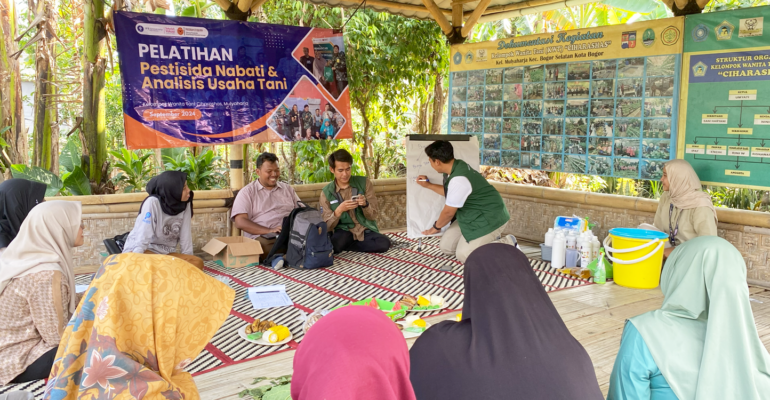
On the other hand, in the SPPI 2024 Agricultural Improvement Program at Pusdikif’s Cipatat Livestock Cluster, IPB introduced pasteurization and cheese-making techniques. The program equipped participants with practical skills in dairy processing and product innovation-such as mozzarella cheese production-that support the development of added value in local livestock enterprises. In addition, IPB lecturers conducted capacity building training for women farmer groups (KWT) in Nagrak, Sukabumi, focusing on healthy beverage production and food processing.
IPB University provides various events that enable local farmers and food producers to connect and exchange knowledge with the academic community. These activities are organized regularly through forums, training programs, and community-based initiatives that promote innovation, sustainable farming practices, and capacity building in the agri-food sector.
- Women Farmers Forum (Rembug Petani Perempuan), organized by TNC IPB University in collaboration with partners such as KRKP, GPN, and Lapor Iklim. This event, held on National Farmers Day at the IPB Dramaga Campus, serves as a platform for knowledge sharing, reflection, and capacity building among women farmers to help them adapt to climate change and apply sustainable agricultural practices.
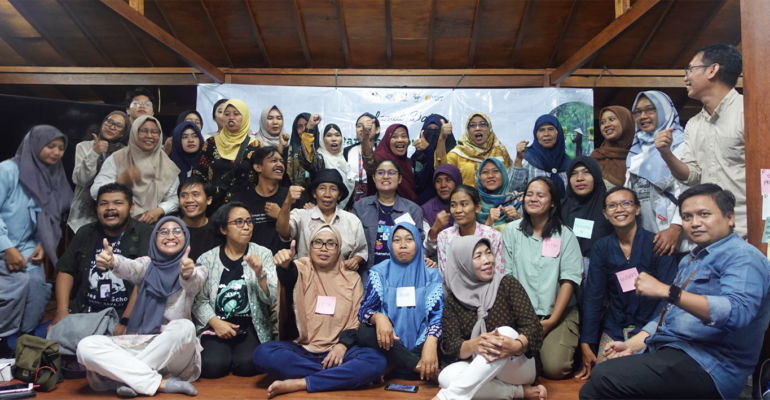
- Semarak Bumi Tani (SERUNI), an event that brings together students, farmers, and the surrounding community to engage in dialogue, promote local agricultural products, and introduce recent innovations and technologies in agriculture. The activities of SERUNI include a farmers’ market, exhibitions, community service, public discussions, and demonstrations of agricultural innovations, effectively bridging campus research outcomes with real field practices.
- Coffee School program, the Directorate of Agromaritime Community Development (DPMA) of IPB provides technical and entrepreneurial training for students and local communities in coffee processing, covering activities such as cherry picking, green bean sorting, roasting, and brewing techniques. The program is held at several locations, including BSP Farm in Cigombong, the Agribusiness and Technology Park (ATP), and Sobatani Café, with the goal of fostering practical knowledge and sustainable entrepreneurship in the coffee sector.
- The School for Smallholder Livestock Farmers (SPR-IPB) serves as a concrete example of synergy between higher education and local communities. The program has expanded to 14 provinces, covering hundreds of villages and benefiting thousands of farmers. Through education and field mentoring, SPR-IPB enhances technical capacity, productivity, and the welfare of smallholder livestock farmers, representing IPB’s tangible commitment to strengthening the local livestock sector.
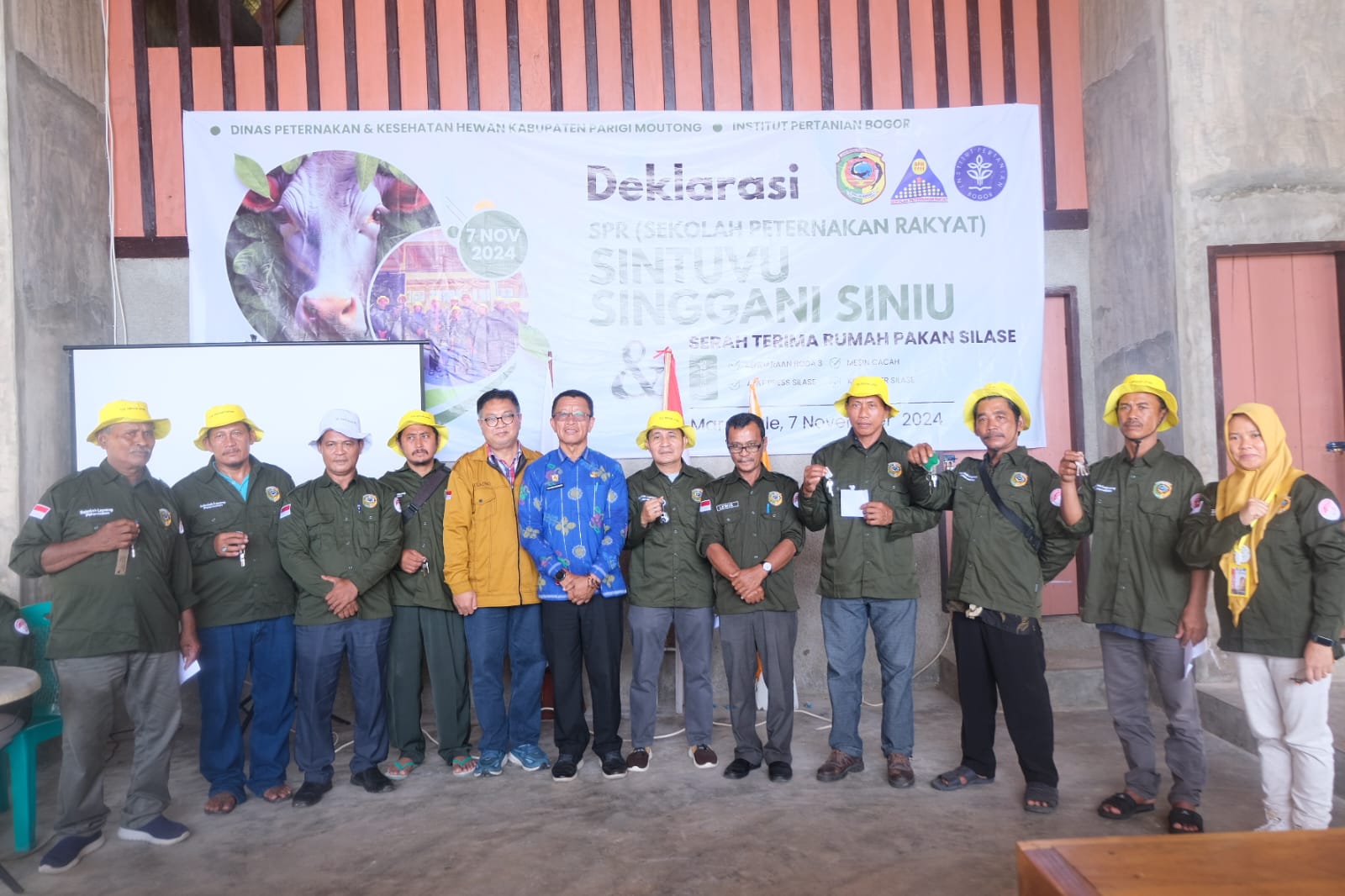
- Tea School program. In the plantation sector, IPB University established the Tea School in Cianjur Regency as part of its program to empower young entrepreneurs in the tea industry. This initiative engages academics, students, practitioners, and the general public to improve knowledge, skills, and awareness of the importance of sustainable tea business development.
- Drone School program, organized by DPMA IPB in 2024, introduces the use of drone technology for land mapping and remote sensing in agriculture. The program involved 45 students and 20 farmers from five nearby villages, as well as lecturers as instructors. Through this activity, participants received technical training, hands-on experience, and drone pilot certification, while also producing cassava commodity maps for the surrounding campus area.
Overall, these various programs demonstrate IPB University’s institutional commitment to promoting inclusive and sustainable engagement between higher education, farmers, and food producers. Through education, innovation, and community-based collaboration, IPB ensures that research findings and technologies developed on campus have a direct and meaningful impact on sustainable agricultural development and the improvement of farmers’ livelihoods.
IPB University provides access to its facilities, technologies, and research outputs for local farmers and food producers to support sustainable agricultural practices and improve food product quality. The SEAFAST Center IPB offers public services in chemical, microbiological, and sensory analysis, as well as food quality and safety testing for small- and medium-scale food enterprises. Through this facility, farmers and local producers can utilize the university’s laboratories and technology for product certification, licensing, and development based on food safety standards, contributing to food security and local agro-industry development.
Access to University Facilities for Local Farmers
IPB has analytical facilities for the public to improve product quality from farmers or local businesses. Facilities at IPB for food analytical or certification:
SEAFAST Center IPB
- Food Microbiology Analysis Laboratory
- Food Biotechnology Laboratory
- Food Quality and Safety Laboratory: Chemistry
- Food Quality and Safety Laboratory: Microbiology
- Food Sensory Evaluation
- Animal Assay Laboratory
Testing Laboratory of the Department of Agricultural Industrial Technology
- Analysis for wastewater and AMDK
- Analysis of the quality of crystal sugar
- Analysis of material and agroindustry product
Testing and Certification Services Laboratory of IPB Laboratorium Jasa Pengujian dan Sertifikasi IPB
- Certified by LP-156-IDN for Analytical test
- LK-336-IDN for Calibration test,
- LSPr-030-IDN,
- LSHACCP-009-IDN,
- LSSMKP-009-IDN for product certification,
- HACCP
Food analysis services
- Chemical Analyses (Proximate (ash, moisture, fat, protein, carbohydrate), Dietary fiber, Vitamins (A, B1, B2, C, E), Minerals and heavy metal (Na, Ca, K, Fe, Zn, Mg, Hg, Co, Cd, Pb, Cu, As, etc), pH dan titrable acid, Fatty acid composition (GC), Sugars (total sugar, reducing and non-reducing sugar, lactose), Cholesterol (GC), Phenolic content (tanin), Formaline and borax (qualitative and quantitative), Qualitative analyses of MSG, nitrate, nitrite, and cyclamate, Beta caroten (HPLC), Amylose and amylopectin (spectrophotometer), Amino acid (HPLC), Water activity, Acidic, acetyl, ester, safonic, peroxide, and iodic values (titrimetric), Nutritional fact, Free fatty acid (titration), DHA, Cyanidic acid (qualitative/quantitative), Carageenan (Manan and alginate), MSG (qualitative), Nitrate/nitrite, Starch (Luf Schrool and Lane Eynon Methods), Pectin, Sacharine and cyclamate (qualitative), Volatile oil, Colorant (qualitative), Sulfite, Smoke test.
- Physical Analyses: Fluid behaviour (Newtonian/non-Newtonian), Rheological analyses by Farinograph, Extensograph and Brabender amylograph), Solid behavior (elasticity, plasticity, visco-elasticity, Texture analysis of food products or materials (viscosity, gel strength, crispiness), Colour (L, a, and b values), Microscopic analysis (e.g. granule size and shape), Total soluble solid, Density, Refraction index, Whiteness, Emulsion stability index, Fat impurity, Optic active, Texture Profile Analysis (hardness, brittleness, elasticity, cohesiveness, stickiness), Thermal properties (thermal conductivity), Polarized Microscopic analysis for starch granular size and shape.
- Microbial Analyses: Pathogen bacteria (Salmonella, Staphylococcus aureus, Bacillus cereus, Clostridium perfringens, Enterobacteriaceae, bacteria spore), Sanitation indicator bacteria (Coliform, E. coli, Streptococcus faecalis), Lactic acid bacteria, Yeast and mould, Total plate count (mesophyl/thermophyl), Aflatoxin B1, B2, G1, G2 (HPLC), Vibrio cholera (quantitative/aglutination), Gram positive/negative bacteria.
- Food Quality Analyses: Nutrition fact, Shelf-life determination of processed food products (Arrhenius Model and Moisture Sorption Isothermic Model), Fat quality, Sensory analysis, Determination of Fo value for thermal process adequacy (batch retort and continuous aseptic system), Other quality analyses according to client request.
PT BLST IPB University provides access to university facilities, innovations, and technologies for farmers through collaboration with Perum Bulog in the development of climate-smart rice cultivation technology. The “Asta Citha Padi” innovation developed by IPB University introduces eight integrated technology components, including seeding systems, water management, mechanization, and climate-adaptive cultivation management. This initiative helps farmers enhance productivity and input-use efficiency while strengthening resilience to drought, flooding, and pest attacks, thereby promoting sustainable farming practices.
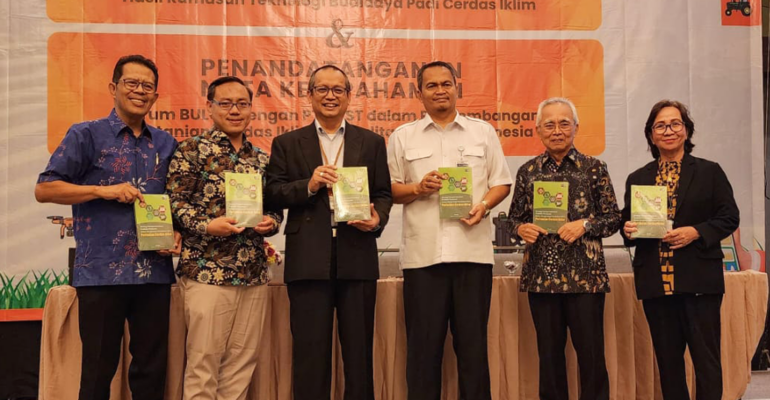
The Agrotechnopark (ATP) IPB serves as an innovation center focusing on social entrepreneurship, agromaritime services, and digital farming implementation to support modern agriculture. ATP has established partnerships with farmers in villages surrounding the campus. In 2024, ATP IPB recorded 10,899 visitors, including 759 partner farmers and 95 assisted villages, reflecting its active role in fostering knowledge exchange and sustainable agricultural development.

IPB University has several market channels to market its products, and farmers, food producers, and home industries are assisted by the university. IPB prioritizes purchasing products from locals to fulfill the need of the university as well as to expand the market. To maintain the collaboration with these smallholders and SMEs, IPB keeps assisting them through technical assistance and knowledge transfer.
IPB University supports the ethical sourcing of food and supplies. This commitment is seen in policies established and enacted for use within the university ground, the immediate surrounding area, and the national scale. In 2020, IPB issued a policy highlighted the ethical sourcing of food and supplies as stated in Rector’s Decree No. 133/IT3/LK/2020 concerning IPB’s Commitment in Achieving SDGs, specifically on page 2, point J “IPB ensure ethical sourcing of food and supplies”.
Sustainable food purchase from local farmers for IPB University canteen IPB University always uses local products for the canteen and meeting programs at the campus. Agricultural products marketed by the Agribusiness and Technology Park (ATP come from products of local farmers as well as ATP self-produce). More than 759 partner farmers and 95 villages are assisted by ATP IPB to produce high-quality organic food. ATP IPB prioritizes purchasing local farmers’ products as part of IPB’s commitment to community engagement and development. Collaborating with farmers enables ATP IPB to guarantee the availability and quality of food products for sustainable marketing.
IPB Shop IPB official stores are available online and offline for the campus population and the public around Bogor, Jakarta, and neighboring districts. These stores sell various products, including vegetables, meats, processed food, herbal, etc. These products are purchased from local farmers, food producers, and home industries, assisted by IPB University.
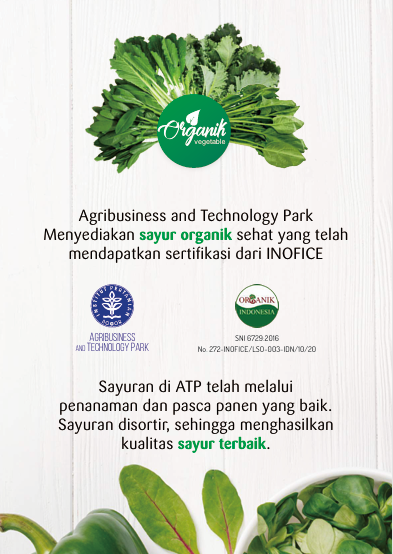
SDG 2 IN NUMBER
7,813
Number of Graduates in 2024
7,813
Number of graduates from a relevant agriculture course
100 %
Percentage of graduates from agriculture
33mt
Total Food Waste
39,054
Number of Campus Population
RELATED NEWS
It seems we can't find what you're looking for.

